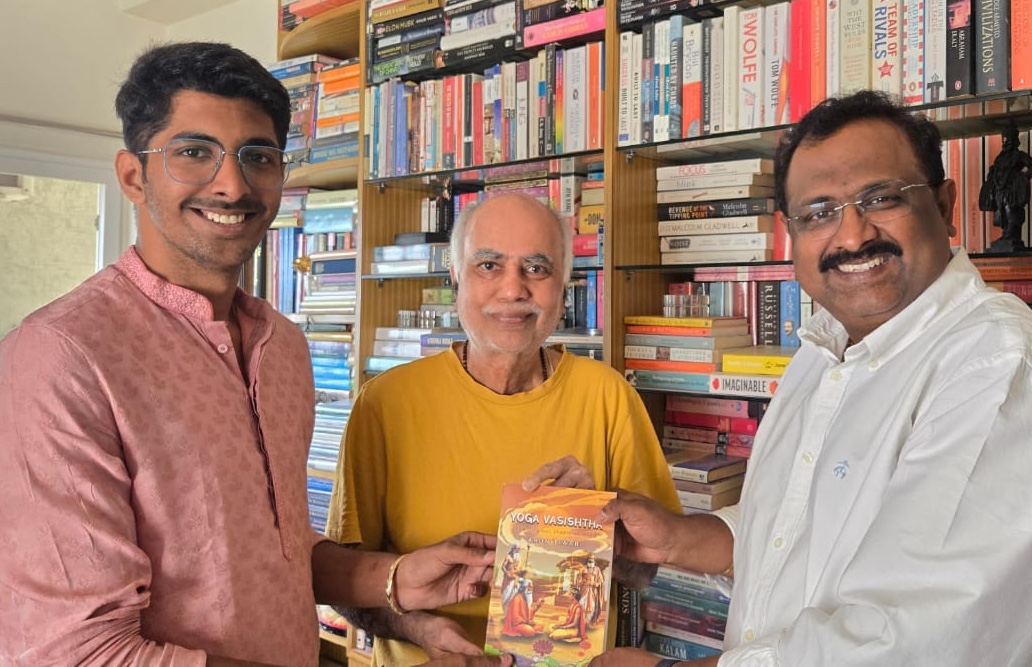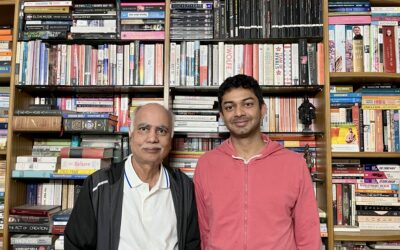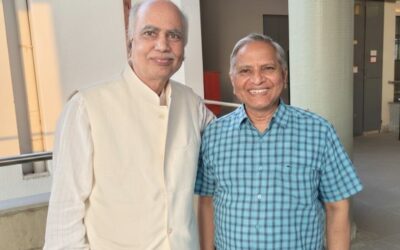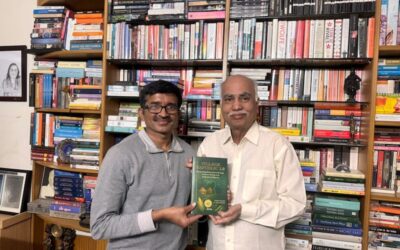
A Book Between Generations
It was a mild noon, neither summer nor winter, when Venkat Kumar Tangirala came to see me. The sun, hidden behind clouds that held back its heat, allowed only a soft light, as if words were holding their breath between two thoughts, unsure whether to be expressed or remain silent. He arrived with his twenty-one-year-old son, Medhansh Tangirala, taller than his tall father, a young man with that familiar mixture of curiosity and hesitation which youth wears when stepping into a room of ideas.
Kumar Tangirala, of Brahminical ancestry, always the steady one, had in his eyes the mild exhaustion of someone who has travelled long, not just across distances but across the years. Medhansh, however, carried that unspent restlessness of beginnings—the kind that believes time is infinite and the world still pliant enough to bend to one’s will. As I greeted them, something stirred within me: a memory perhaps, or the faint echo of what it feels like to be twenty-one and sure that understanding lies just one book away.
We settled into conversation as easily as one slips into an old armchair. Kumar spoke of work and the state of things—his windmills, the confusion of tariff times, the noise—business became a relentless chase for something undefined. Medhansh listened, occasionally nodding, but I could sense his mind was elsewhere, moving through the invisible labyrinth of screens and opinions that define his generation’s consciousness.
And then, I placed a copy of my new book, Yoga Vasishtha: The Original Thesis on Mind, before them. Its orange-yellow cover caught the light for a moment, like an idea surfacing from deep meditation. I said nothing for a while. The silence seemed to belong to the book itself, as though the centuries between Sage Vasishtha and us had folded into this one quiet moment in my living room.
Medhansh turned it in his hands. “Is it Rama sitting here? Is this philosophy or psychology?” he asked in a sincere, disoriented tone of one trying to map the borders of meaning. “It is both,” I replied. “And neither. It is a mirror. When you look into it, it shows not the world—but the mind that sees the world.”
He looked at me, perhaps expecting elaboration, but I smiled instead. There are moments when explanation kills the wonder it seeks to awaken. And Yoga Vasishtha—that vast, contemplative ocean of inquiry—demands wonder more than comprehension. It begins where the world ends and the mind begins to ask, What is real?
Kumar spoke then of how his son’s generation had been overwhelmed by the post-truth chaos—the endless tide of news, trends, and digital drama. “Medhansh says everyone has an opinion, but no one seems to know anything,” Kumar sighed. “I told him, maybe you should read something old enough to be new again.”
The sentence hung in the air, like incense. I felt its truth deeply. In a time when truth itself is fractured, the ancient voice of Vasishtha resonates with radical clarity once more. He doesn’t promise peace or salvation. He offers understanding—the quiet kind that dismantles illusion, not through belief, but through awareness.
I told the young man, “Look, Medhansh, this book is not to be read as one reads the news or a novel. It is to be entered into, like a forest. The more you wander, the more you lose the map—and in losing it, you begin to see differently.” Medhansh smiled faintly, half in politeness, half in intrigue. “But what is it about?” he asked. “It is about the mind,” I said. “The one thing we carry everywhere but rarely meet.”
As we spoke, I saw in him what I often see in young faces today—a subtle fatigue. The fatigue is not of labour but of attention. Attention that is stretched thin, pulled apart by devices, deadlines, and desires. In the post-truth world, where even silence is commodified, the mind rarely rests long enough to see itself. Yoga Vasishtha begins precisely there—at the threshold between restlessness and reflection.
Kumar looked at his son, perhaps remembering his own youth when questions still weighed and silence was still a language. “I think this will appeal to you,” he said. “It’s about the art of thinking, not about conclusions.
Medhansh nodded, holding the book as though it were a fragile relic from another time. I watched him and thought of Rama—the young prince in the scripture—disillusioned with the world, asking his teacher why life felt meaningless despite all its pleasures. That was the beginning of Yoga Vasishtha: a conversation between despair and wisdom. How fitting, I thought, that it should begin again here, between a father and his son.
Outside, the evening had deepened. The light was turning golden, spilling gently through the window, and for a moment it seemed that time itself had paused to listen. We spoke then of the relevance of ancient thought in modern times. I told them that philosophy, when lived, is not an escape but an awakening. It teaches discernment—the rarest virtue in an age where information masquerades as knowledge. The Vasishtha way is not to retreat to caves, but to live in the world with the stillness of one who knows that the waves and the ocean are not different.
Kumar asked softly, “Do you think young people can understand such depth?” I looked at his son, who was now tracing the Sanskrit title on the cover with his fingers. “They feel it,” I said. “Only the words haven’t come to them yet.”
Perhaps that is what Yoga Vasishtha offers—language for the inarticulate knowing that every young soul feels when it looks at the world and wonders, Is this all? The book tells us that the world we see is but the projection of the mind—shifting, shimmering, impermanent. It doesn’t condemn the illusion; it teaches us to see through it. In that seeing, freedom begins.
The conversation drifted, as all good ones do, into silences and digressions. Kumar spoke of his worries for the future, his son, and his confusion about what to believe. And I, quietly, thought of Vasishtha’s own words: “The mind is the cause of bondage and the mind is the cause of liberation.” It is that simple—and that difficult.
As they rose to leave, I felt a certain serenity. The book had found its next reader, or perhaps, its next questioner. I signed it with a few words: “May this not give you answers, but the courage to question rightly.”
Kumar clasped my hand warmly. “You always make even confusion sound noble,” he laughed in his trademark crackling manner. Medhansh smiled too, and I noticed that his eyes had softened, as if some veil had thinned, ever so slightly.
When they left, the house grew quiet again. I thought of the generations—how they come with their noise and their brilliance, their disbelief and their yearning. Each must find its own bridge between science and spirit, intellect and intuition. The mind remains the battlefield, as it was in Rama’s time, as it is now in the age of algorithms.
And so, the scene lingered in my mind long after the door closed: the father, the son, and the book between them. A trinity of time—the past, the future, and the eternal present—bound by a single question: What is real?
That is where Yoga Vasishtha: The Original Thesis on Mind begins—and where, perhaps, all modern minds must return.
MORE FROM THE BLOG
From Disease to Wellness: Time for a Paradigm Shift
Modern medicine is magnificent at one thing: it rushes heroically to the battlefield after the war has already been lost. When the coronary artery is blocked, a stent is inserted. When the pancreas fails, insulin is administered. When cancer erupts, it deploys...
A Hero’s Journey of Taking Cognition Beyond Mortal Neurons
In an age mesmerised by rankings, metrics, and loud declarations of success, the most consequential journeys often unfold quietly. They are not propelled by brilliance alone, but by curiosity, humility, and an unyielding fidelity to truth. The exploration of...
Science, Service, and the Long Goodbye to Leprosy
It was already evening when they arrived, and I sensed a good feeling. The light had softened, retreating gently from the edges of objects, as though the day itself wished to listen to what came next. Dr. Gangadhar Sunkara came with Dr. Chinnababu Sunkavalli—both...




This piece really touched me. There’s such warmth and honesty in the way you write. It feels like sitting together and talking about life, quietly but deeply. The connection between generations came through so beautifully, and it reminded me how much meaning there is in simple conversations. Truly proud of you for expressing such insight with so much heart.
Unlike many scriptures that speak in commandments, Yoga Vasishtha speaks in stories, debates, logic, poetry, and philosophical journeys — exactly the kind of multi-layered thinking modern youth need. In an era obsessed with productivity and performance, this book whispers a different truth: A calm, sharp, self-aware mind is the greatest technology. Yoga Vasishtha does not demand belief; it invites reflection, questioning, and self-discovery. It is not about renunciation but about living with depth, clarity, and inner freedom — a manual to navigate life with wisdom in a noisy age. Yoga Vasishtha is the map of the inner cosmos — showing not what to believe, but how to awaken.
In a world overflowing with information but starving for wisdom, this ancient masterpiece speaks with startling modern clarity. Long before psychology, neuroscience, and mindfulness became popular hashtags, Yoga Vasishtha explored the nature of thought, perception, identity, and reality itself. It doesn’t ask you to blindly believe — it invites you to question, experience, and awaken.
For younger readers, especially today’s restless, curious minds, this text is a quiet revolution. It tells you that your mind is not a cage but a creator, that suffering comes from imagination — and so does freedom. It breaks the myth that life is a race to “become” something. Instead, it reveals the truth: you already are, and your journey is to remember. Great reading about Tangiralas.
Yoga Vasishtha gives you tools for resilience, clarity, and inner strength — not by preaching rules, but by igniting understanding. If you want to rise above stress, confusion, and the pressure to conform; if you want to play life like a master, not survive like a pawn — this book is your compass. It brings stillness to chaos, purpose to uncertainty, and empowerment with every breath. As I see it, this fascinating book must not be seen as scripture, but as an operating manual for consciousness, because your mind deserves to know its own power, and because this is the wisdom that upgrades your life. Thanks for taking the message out of cults for the benefit of a larger readership.
Dear Sir, Greetings! A deeply moving reflection, sir. Your writing beautifully bridges generations—reminding us that wisdom is not inherited but rediscovered anew by every seeker. The conversation between father and son mirrors the timeless dialogue between questioning and understanding, much like the essence of Yoga Vasishtha itself. I was especially struck by your line, ‘It’s about the mind—the one thing we carry everywhere but rarely meet.’ Such a profound truth for our times of distraction. Thank you for continuing to inspire us to think, reflect, and see beyond the noise.” Warm Regards.
Marvellous sir, you are having the capacity to enter into the soul of the people through the different style writings, the Books or the Blogs. The same also depicted through your conversation with Shri VK Tangirala and his son Medhansh. Dr Ashok Kumar Tiwari ji said truly that your good self (Prof. Arun Tiwari) is a modern days Maharishi Vashishtha.
Arunji, the dialogue between generations and the quiet wisdom of Yoga Vasishtha are captured with such grace. “May this not give you answers, but the courage to question rightly” truly stayed with me. Nice to see Kumar and his son Medhansh with you! Best Regards!
Dear Prof
I hope to hear feedback from the young man …
I am sure he was comforted by your insightful words – words that put confusion into context.
Yoga Vasishtha: The Original Thesis on Mind the highly motivating book re-explained by Professor Arun Tiwari jee for modern generation is one of the best book I have read. I felt fortunate reading preaching of Lord Sri Ram’s guru Maharshi Vashishth. I don’t exaggerate calling Professor Arun Tiwari as modern days maharshi Vashishth.
At the age of 60+ when I read the book I usually go in trans when he explains the mind. How life goes is very interestingly explained with the help stories. I was thinking while reading it that why I missed it in my early days.
Lord Sri Ram got this teaching in his younger age. I feel our younger generation should go through this book that will help them sail their boat of life forever. These scientific treasures already available in our ancient classics are being missed by many.
I have been blessed by Professor Tiwari for decades. Lovingly he calls me his younger brother. That’s his greatness.
Be blessed Professor Tiwari to write more books like this. I am awaiting his new release The Gita 101. Silently I have seen, a wonderful book being explained by him. May be in late age, but God is blessing and teaching me through him.